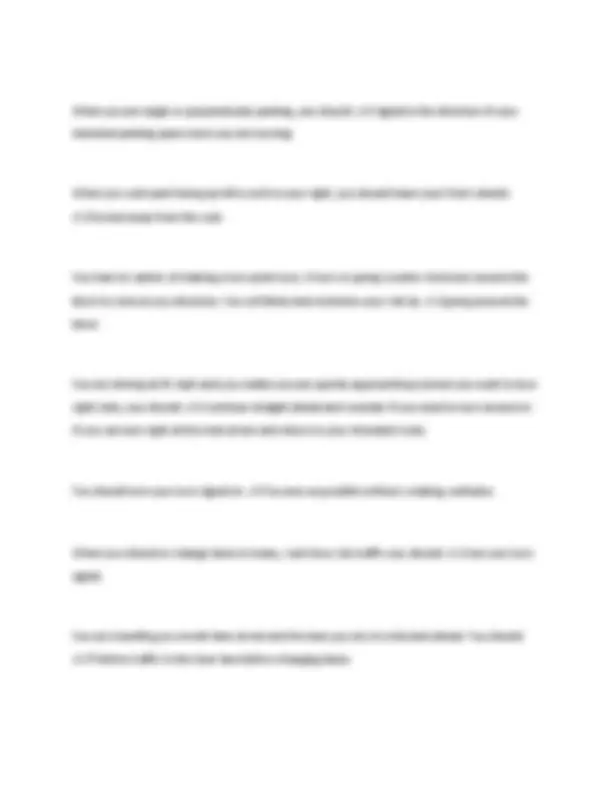



Study with the several resources on Docsity

Earn points by helping other students or get them with a premium plan


Prepare for your exams
Study with the several resources on Docsity

Earn points to download
Earn points by helping other students or get them with a premium plan
Community
Ask the community for help and clear up your study doubts
Discover the best universities in your country according to Docsity users
Free resources
Download our free guides on studying techniques, anxiety management strategies, and thesis advice from Docsity tutors
A series of multiple-choice questions related to driving maneuvers and safety, focusing on topics such as lane changes, turning, reversing, and parking. The questions are designed to assess understanding of safe driving practices and techniques. Each question includes a correct answer and a brief explanation, providing valuable insights into the principles of safe driving.
Typology: Exams
1 / 2

This page cannot be seen from the preview
Don't miss anything!


Which of the following is the best procedure for making a lane change to the right? ✔✔Check all sides for a safe gap in traffic, signal right, re-check blind areas to the rear in the direction you plan to move, steer into the lane when safe then cancel the signal. You are changing lanes in traffic on a multiple-lane street. As you start to steer into the other lane, you should: ✔✔maintain the same speed When your vehicle turns a corner, the tracks made by the rear tires are always: ✔✔tighter than those made by your front tires. When you are new driver and practicing turning right or left with good traction and normal conditions, your speed should not exceed: ✔✔5 to 15 mph To reverse direction on a two-way street, you will best manage your risk by: ✔✔making a two- point turn by backing into a driveway on your right then driving forward into the street. A three-point turnabout: ✔✔should only be used when there is not much traffic. When you perpendicular-park, you should, when possible, select a space that lefts you drive into the facing space so that when you leave you will: ✔✔not have to back out.
When you are angle or perpendicular parking, you should: ✔✔signal in the direction of your intended parking space since you are turning. When you curb-park facing up hill a curb to your right, you should leave your front wheels: ✔✔turned away from the curb. You have to option of making a two-point turn, U-turn or going counter-clockwise around the block to reverse you direction. You will likely best minimize your risk by: ✔✔going around the block You are driving at 30 mph and you realize you are quickly approaching a street you want to turn right onto; you should: ✔✔continue straight ahead and consider if you need to turn around or if you can turn right at the next street and return to your intended route. You should turn your turn signal on: ✔✔as soon as possible without creating confusion. When you intend to change lanes in heavy, rush-hour city traffic you should: ✔✔use your turn signal. You are travelling on a multi-lane street and the lane you are in is blocked ahead. You should: ✔✔Yield to traffic in the clear lane before changing lanes.